|
|
|
cobbles of Antigua
Friday, March 24 2006
setting: Quetzaltenango, Guatemala
I took a few pictures during our final dreary breakfast this morning and then it was off to our last day of class at Celas Maya. Gretchen had been researching the travel options that would get us to our next destination, the historic city of Antigua. The easiest method, by pullman bus, would require us to leave class before it was even half over today. So Alma and I didn't do anything too strenuous; instead we just played the Spanish version of the game Scrabble. I could see just from the half of a game we played that it had potential as an effective vocabulary builder. Meanwhile clouds thickened overhead, threatening the end of the six month dry season.
After receiving our "diplomas," we walked down to a corner near the Parque and immediately had a ride in a crowded minibus to the part of Xela from which the pullman bus departs. It's a very different from the part where Celas Maya lives, with many fewer gringos and more stores and markets catering to locals.
Superficially, a pullman bus seems much classier than your standard chicken bus. While a chicken bus is basically a repurposed American schoolbus, a pullman is more like a Greyhound, complete with individual seats that can be leaned back. What we didn't know was that a pullman, at least the one we were in, has a tendency to suck in a good fraction of the fumes it generates, making the cabin of the bus into an imperfect gas chamber. I use the term "imperfect" because few people actually are killed in there. It seems the fumes are at their worst in the back of the bus. That's where Gretchen went because the seats form a long bench there, making a good place to lie down. We didn't notice until our other seats had been taken that the fumes were slowly killing us. The only thing keeping me from panicking was the behavior of the other Guatemalans nearby, none of whom seemed to notice the horrible condition of the "air."
Three hours later Gretchen had a bursting bladder and both of us were weak for want of air. We were supposed to make a connection with a chicken bus in the town of Chimaltenango, which I thought was a much bigger town than it actually was. When our bus stopped in Chimaltenango, I thought we were on the outskirts of town and would be stopping again later in the center (after all, that's how it had been in Xela). Gretchen thought maybe I should ask, but I was so sure of myself (and so nervous about asking, particularly in Spanish - though I'm the kind of guy who never asks anyway) that I said asking was unnecessary. As our bus rolled out into the hinterland and started climbing a ridge and it gradually became clear that we'd missed our stop, Gretchen asked some folks near us about Chimaltenango and they said we'd already passed it. Oh, that wasn't good. Gretchen started to hit me with both barrels of her I told you so cannon, but I was in no mood for that, and she was in no mood for my not being in that mood. So we had an awkward truce that lasted from where the pullman finally dropped us off and continuing for most of the chicken bus ride to Antigua. The air was much better on that chicken bus, and the ride wasn't even particularly long. It seems that our missing that stop at Chimaltenango meant that the pullman had managed to get us fairly close to Antigua after all. I'd thought Gretchen was desperate to pee, but once we were in Antigua she kept stopping to marvel at the sights and read the signs, some having nothing to do with hotels, urination, or anything else that was of immediate concern.
Gretchen had looked through the Lonely Planet Guide to see where we should stay and had emailed a number of places from Xela. High on our priority list was either a bathtub or a swimming pool, just by way of compensation for the lame showering situation back at our place in Xela. (We had had to warn our madre every time we wanted a shower, and then could only use it for a minute or so. It had been such a bother I'd only taken four showers in two weeks.) The first hotel we looked at was the Hotel Palacio Chico very close to the middle of Antigua, but it didn't have bathtubs or a pool, so we thought we should look at the Hotel San Jorge to the south, which the guide had described this way:
"Though in a modern building, this hotel has a rustic reception area and all 14 rooms share a long balcony and overlook a beautiful flower-filled garden complete with tinkling fountain and chirping birds, The rooms have a fireplace, cable TV, pretty tiles and a bathroom with a tub. Guests can use the swimming pool of the posh Hotel Antigua nearby. The English-speaking local host is very welcoming. Ask about discounts in low season."
When we arrived at the Hotel San Jorge, we were led directly to that English-speaking local host, the one who is supposedly very welcoming. He was a disturbing thing to behold, a fat man with sunburned skin peeling from the bald dome of his head. In the corner of one of his eyes was a dime-sized growth that I would later refer to as a siamese twin. Maybe he was having a bad day, because he wasn't being especially welcoming. Perhaps the problem was that we were interrupting him during dinner, as he wolfed down beans and tacos while his wife picked at her plate gingerly. Gretchen thought he was a certain type of Latin American macho man, the kind who allows himself to get enormously fat as a means of demonstrating his machismo, as if to say, "I'm macho and my wife feeds me constantly. All I have to do in my macho life of leisure is lie around like a sofa and eat."
We looked at a room and it had bathtub alright, but it was an ugly place with wood paneling and other horrors we'd come to Antigua to flee. So we went back to Hotel Palacio Chico and agreed to the terms the manager had arranged earlier. There were only two things wrong with our room. The first was that it had one of those dangerous electric-powered showerheads (it shocked me, but we were desperate and used it anyway; evidently there are places you're just not supposed to touch them). The other was that our bathroom seemed to adjoin the kitchen of a neighboring establishment, and we could hear kitchen noises until a certain hour. Also, sometimes our room filled with the smell of feces, perhaps from a nearby bathroom at that neighboring establishment. Closing our bathroom door solved that second problem, but led us to speculate whether people were sneaking into our bathroom through a secret entrance and taking the opportunity to move, as it were, their bowels.
Once we'd had showers and were no longer carrying our luggage, we were finally free to explore the city. Antigua is really two parallel cities. The least visible of these is a modern one with schools, internet cafés, churches, apartments, restaurants, and businesses. This city occupies the spaces between the buildings and compounds of the other city, the one destroyed in a massive earthquake that happened in 1773. That older city was once the capital of Guatemala and had been a showpiece of all that was mighty, beautiful, and holy about the global Spanish Empire during the height of its power. Antigua wasn't called Antigua when that earthquake rattled it into oblivion. That name was bestowed upon it later as people gradually trickled back in to live among the beautiful ruins. Over the subsequent years efforts have been made to strengthen, rebuild, haul rubble away from, or otherwise protect many of the ruins, some of which were better preserved by the long abandonment of the city than they were ruined by the earthquake itself. The presence of so much spectacular classic Spanish architecture frozen in time has made Antigua the major tourist destination of Guatemala. Consequently, there are a lot more gringos in Antigua than there were in Xela. Some people would have you believe that's a bad thing and in a way it is, but the gringos are there for a reason. Antigua is a wonder of the world, whereas Xela is a grimy trash-strewn dump.
It isn't just that Antigua itself is one of the most beautiful towns you can possibly visit, it's also the setting: Antigua sits nestled in lowlands surrounded by three tall volcanos, with cobble-paved streets oriented so as to showcase the volcano cones to maximum advantage.
While Antigua is a relatives small town (its population is 40,000), it lies within easy chicken bus range of the overcrowded modernist hell of Guatemala City (where the capital was moved following that 1773 earthquake). Consequently, Antigua has always been a favorite destination of Guatemala's legions of pickpockets. Clueless tourists marveling at partial domes, orphan columns, or religious processions are easy marks for an experienced practitioner of the unfelt crime. In response, Antigua has a much more active police force than Xela. One could spend days in Xela and never see a single policeman, whereas in Antigua we encountered several corners guarded by three or four uniformed armed men. By "armed" I mean they carried machine guns.
There's obviously much more civic pride in Antigua than there had been in Xela. One sees very little trash blowing through Antigua's streets, and it's not uncommon to see someone applying a fresh coat of paint. Furthermore, there are fewer street dogs in Antigua and the ones you see mostly look healthy.
We had dinner at an Italian place called Queso y Vino. It's a little strange ordering Italian food off of a menu written in Spanish, but I could get used to it. With our pasta we ordered a small bottle of wine, but we were so stuffed (in my case, mostly from the queso that came with my salad) that we couldn't drink it all, so we poured most of it into an Agua Pura bottle and took it home with us. At a neighboring table, a half dozen photogenic, youthful gringos sat around chatting among themselves in flawlessly-fluent Spanish. It made me jealous.
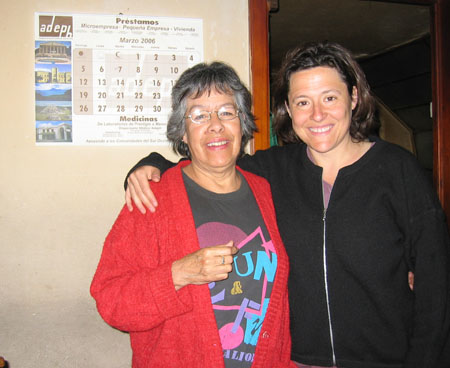
Gretchen with our madre.
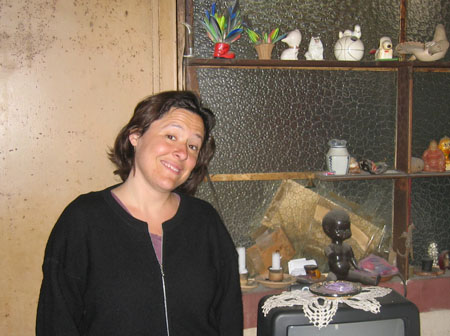
The dreary kitchen where we ate so many meals.
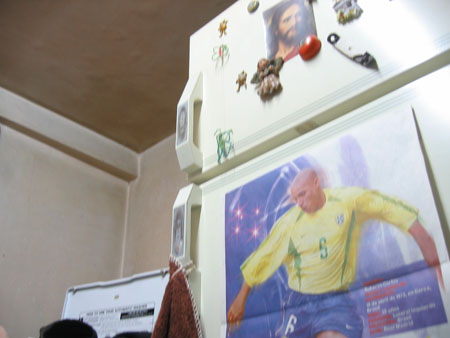
The refrigerator in that kitchen.
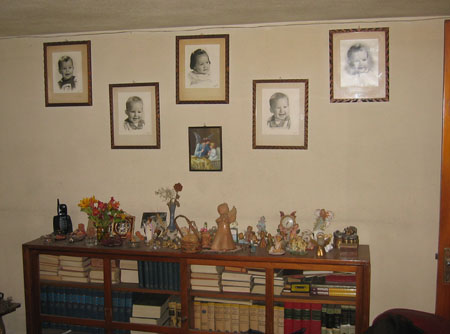
Pictures in our madre's living room.
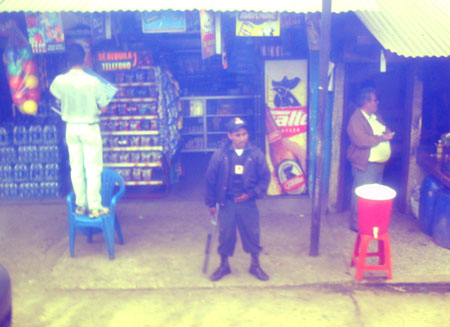
Some places in the outskirts of Xela had armed men guarding them. This is common in Guatemala, where actual police can be very rare.
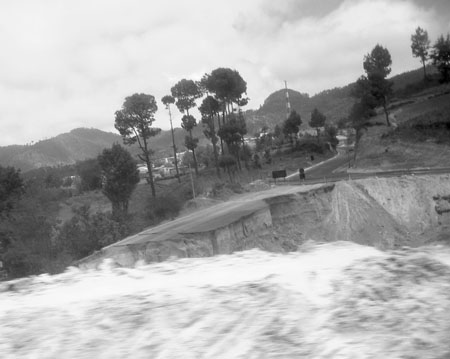
A washed-out roadway somewhere in the highlands between Xela and Antigua. I'm posting this in black and white because the colors were all screwed up by the tinted windows of the pullman bus, something that I was only marginally able to correct in the earlier picture of the guy with the gun.
For linking purposes this article's URL is:
http://asecular.com/blog.php?060324 feedback
previous | next |





